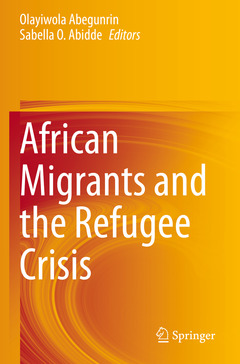Description
African Migrants and the Refugee Crisis, 1st ed. 2021
Coordinators: Abegunrin Olayiwola, Abidde Sabella O.
Language: English
Subjects for African Migrants and the Refugee Crisis:
Publication date: 11-2021
328 p. · 15.5x23.5 cm · Paperback
Publication date: 11-2020
328 p. · 15.5x23.5 cm · Hardback
Description
/li>Contents
/li>Biography
/li>Comment
/li>
Introduction.- Section One: History, Rights, Policy and Protocols.- Chapter 1: Forced Migration and the Failure of Governance.- Chapter 2: Public Policy and Migration in Africa: A Multi-Theoretical Approach.- Chapter 3: Migration and Human Rights in Africa.- Chapter 4: The Global Border Industrial Complex and Eastern Africa: Analysing the Political Economy of Transnational Migration.- Chapter 5: Migration and Human Rights in Africa: The Policy and Legal Framework in Broad Strokes.- Section Two: Regional Perspectives and Implications.- Chapter 6: African migrants in Poland 1945 – 2019.- Chapter 7: Globalizing forces on migration? A Dual Process.- Chapter 8: Non-Recognition and Its Implications: African Asylum Seekers in Israel.- Chapter 9: Rise of Populist Parties in the Era of Migration Crisis.- Chapter 10: African Migration to Brazil in the Twenty-First Century: New Trajectories and Old Paradigms.- Chapter 11: Libya and African Migration to Europe.- Section Three: Impact, Cost, and Consequences.- Chapter 12: Evaporating Mediterranean: The Fate of Migrants in a Shrinking Sea Commons”.- Chapter 13: Criminalizing the Mediterranean Crossing: The Regulation of Migrants, Refugees, and Rescue Missions at Europe's Southern Borders.- Chapter 14: Skilled Female New Canadians and Mental-Health Challenges: Effect of Unemployment and Underemployment.- Chapter 15: The Human Cost of the Refugee Crisis in Africa.- Chapter 16: The Political Economy of Transnational Migration: A Case Study of Nigerian Immigrants in The United States.
Sabella Ogbobode Abidde is an Associate Professor of Political Science and member of the graduate faculty at Alabama State University, US, where he teaches courses in comparative politics, international relations, African politics and institutions, and the politics of developing nations.
Analyzes African migration within the context of the refugee crisis
Examines economic, political, and social factors that have contributed to the crisis
Provides case studies discussing humanitarian failures and other negative consequences suffered by African migrants




